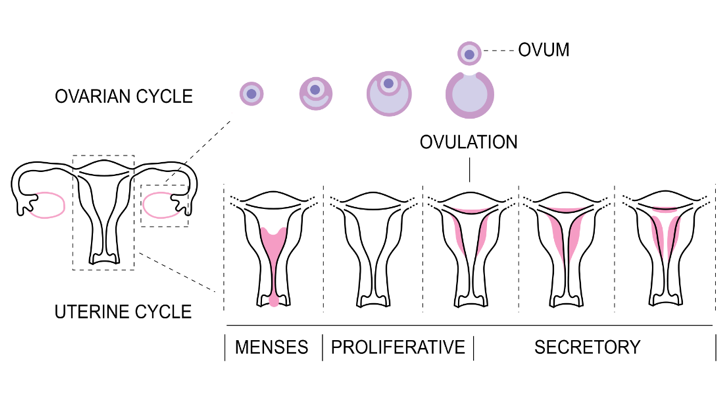
Quick Facts:
- Your menstrual cycle begins on the day you start bleeding or see blood for the first time on your pant.
- During menstruation, the lining of the uterus flows out through your vagina, which is necessary to keep your reproductive system in good shape.
- A woman’s period typically lasts on between two and seven days.
- You only lose about 3 Tablespoons of blood during your period, although it can seem like more!
- About 28 days after you got your period, you'll get it again, but it can vary with shorter and longer cycles in some other women.
- Each month, the uterus prepares for possible pregnancy
- Hormones cause thickening of the inside of the womb
- If an egg is fertilized, it moves into the uterus and may burrow into this thick lining
- The egg will divide millions of times over 9-10 months
- Most females begin menstruation between 10-15
- As with males, many hormonal changes are occurring, so the body may take a couple of years to adjust
- Cycle may be irregular
Your first period (menarche) quick facts:
- typically occurs around age 12 but can start at age 10 up to age 15.
- occurrence depends on overall health , diet and often similar to when your mother started her first period
Sure we all have funny stories of our first periods! It may happen at school, sometimes it will happen while you are asleep (lucky you).
During the first few years you have your period, don’t be bothered if it’s not regular. It is actually normal for it to be a bit irregular. Sometimes you ll wait only 28 days between cycles. Other times it may be 40 days! There’s no need to worry; it is not the same in all women - and you can always talk to a health care provider you need to.
What’s happening during my period?
Menstruation is what most people call having your period. Menstruation is part of the natural process that prepares your body to be able to get pregnant someday when you are mature and ready. This is also called your “menstrual cycle,” with your period being the first day. During menstruation, the lining of the uterus shed out through your vagina.
A woman’s period typically lasts from 5-7 days. Some days it will be a “heavy flow,” with more blood leaving your body. Other days will be a “lighter flow,” when less blood will trickle out.
Taking care of your body during your period
When you are menstruating, it is important to take good care of yourself! If you have cramps, before or during your period, try taking a warm bath and soaking your tummy. It might help soothe away the pain. Tea and warm drinks might also help to ease off the cramps, as would a heating pad.
If you experience cramps, try taking some paracetamol to help relieve the symptoms of cramps. If your cramps are unbearable, talk to a doctor or nurseabout other possible remedies like prescription medication or the help of birth control pills.
Feminine Products
While you have your period, you want to absorb the flow of blood in order to stay clean. There are different options and your mom, sister, or other older female friend/relative can help you decide what's best for you.
Pads (sometimes called sanitary towels) stick to your underwear and absorb the flow of blood once it leaves your body. The come in many sizes, thicknesses, and widths – you may have to experiment to find the best one for you. If you don’t have access to pads, you can use clean cloths - just fold pieces of cloth thick enough to absorb the menstrual flow, and have the edges of the material extend over your underpants to catch any leakages. Each cloth should be changed, and washed in hot soapy water, and properly dried, before being used again.
During the day, depending on how strong your flow is, you should change your pad or cloth every few hours. At night, using a thicker pad or making your folded cloth thicker in order to be ok for you throughout the night should be avoided. It can be harmful because you cannot get enough air.
MENSTRUAL Health Related Problems
PREMENSTRUAL SYNDROME (PMS)
- Variety of symptoms that some females experience
- Occurs before the menstrual period
- 2 weeks – couple days before period
- Some females never experience PMS
Symptoms
- Nervous tension, anxiety, irritability, Bloating, weight gain, depression/mood swings, fatigue
Causes aren’t completely understood…
- More common in 30’s women
- Related to hormone imbalance
- Nutritional deficiency
Treatment
- Change in diet & exercise
- Serious cases
- Consult with doctor and follow the prescriptions exactly (eg: antidepressant drugs)
Dysmenorrhea
- Aka “menstrual cramps”
- Painful contractions in the uterus
- Usually mild – lasting several hours
- More painful cramping lasting 1-2 days is normal
Treatment
- Light exercise
- OTC pain reliever can help (except aspirin!)
- Warm bath/heating pad may relax muscles
* Severe or persistent cramping may be an indication that medical attention is necessary*
Amenorrhea
- Lack of menstruation by age 16 or stopping of menstrual cycle in a female who previously menstruated
- Cause
- Physical defects in sex organs
- Diseases
- Diabetes
- Tumors
- Infections
- Lack of maturation of the endocrine system
- Excessive athletic activities
- Emotional distress
- Eating disorders/starvation
Menopause:
- The menopause is the end of a woman's reproductive phase, it commonly occurs between ages 45 and 55.
- The age of menopause is largely the result of genetics
- Menopause can be very uncomfortable due to hormonal changes which may result in strong feelings and hot flushes.
